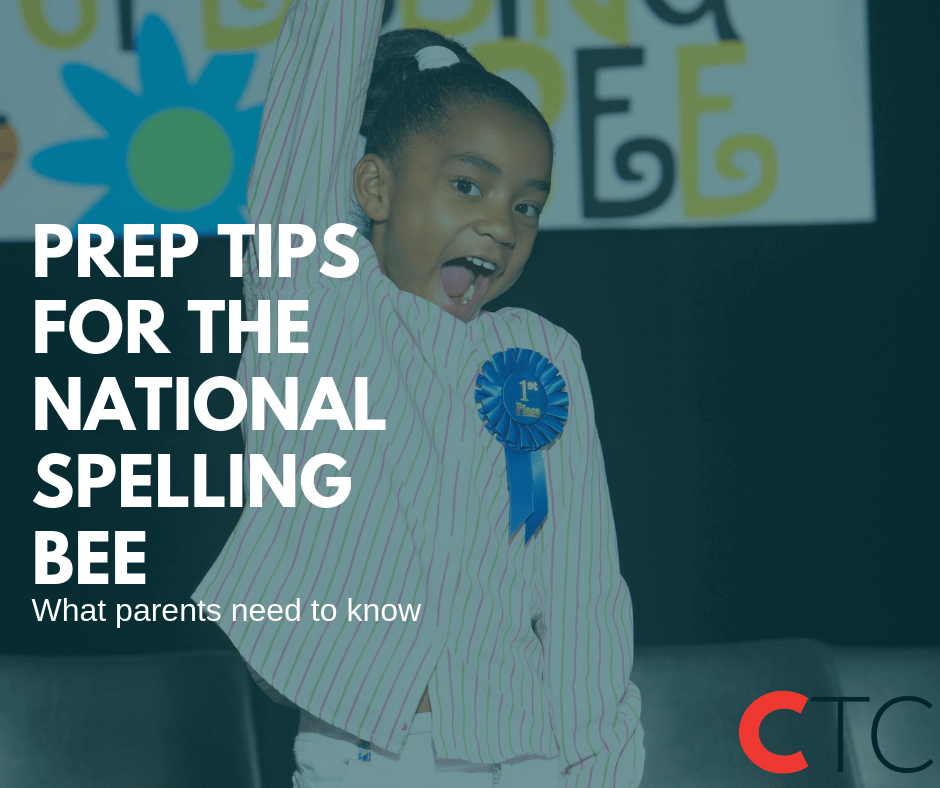It’s an exciting time of year in the spelling bee world! It’s time for the 92nd annual Scripps National Spelling Bee, which will begin this Sunday, May 26, 2019 and last until Friday, May 31. We’re even more excited because our own Critical Thinking Child, Jael Green, has advanced to the national bee! At age nine, she’ll be representing the 5:30 Scholars and Freedom Home Academy as speller 171. The bee started with 11 million students and is now down to the 565 best spellers.
If your child hopes to reach a new level in next year’s bee, here are some things to keep in mind as you’re enjoying the excitement this year.
Study – but don’t let your child burn out!
Studying for a bee is important, but it won’t do any good if your child burns out. We recommend two hours of studying each day during the school week and four hours a day on the weekend, but keep an eye on your child. You’ll most likely want to break this time up into two or three shorter sessions.
Also, think about varying the location of studying; routine is great, but changing the scene will help your child adapt to remembering the words in many different contexts. If you receive a list of words from your school, those are great words to start with, and make sure that your child practices with the dictionary to understand parts of speech, pronunciation, and conjugations. Remember to enjoy the process and experience rather than solely focusing on outcome! You can even apply the TAP Method to measure progress.
Don’t just study words
While studying spelling words is important, many parents overlook other academic activities that can contribute to spelling bee success. Scripps Bee Pronouncer Dr. Jacques Bailly recommends that students read as much as they can about anything they like, write often, and use new words in their everyday speech. Students can also improve their vocabulary by asking what unfamiliar words mean and even looking them up in a dictionary themselves.
Focus on root words AND the oddballs
According to Dr. Bailly, a great way to improve your odds of spelling an unknown word correctly is to focus on root words and word patterns. He emphasizes that many commonly used words come from Greek or Latin roots, so learning those root words and spelling patterns will carry students a long way. He cautions against relying solely on word patterns, though. The English language is strange and some spellings make no sense at all (this is why it’s far easier to teach your child how to read by focusing on the sounds within the English language).
Practice public speaking
Even if your child knows the words backward and forward in the comfort of your home, that may not transfer to confidence and success on Bee Day. Encourage your child to practice speaking in front of other people in different contexts before the big day. Instead of just practicing spelling on the couch at home, have your child stand up with the family as an audience and present the words the way they will presented in the actual bee, including definitions and sentences. This practice doesn’t have to be limited to spelling; you can have your child practice speaking in front of other people at school, at home, at church, or wherever you can find an audience! The more comfortable your child is in the spotlight, the less likely they will be to freeze and forget what they’ve learned.
Choose the right coach (or none at all)
You may have heard that hiring a spelling coach for your child is the best way to achieve spelling bee success. While this may be a good fit, here are some things to think about when considering whether to hire a coach:
- How much does the coach charge? Many coaches charge as much as $200/hour. Make sure you understand the investment and what you’re willing to spend going into the arrangement.
- What is the coach doing during sessions? If it’s dictionary practice and quizzing, consider whether this is something you would be willing do yourself on your own time for free. On the other hand, if the coach brings something new to the table that you’re unable to provide, it may be a good fit.
- How does the coach interact with your child? While coaches may seem like a good idea and may help your child take the bee more seriously, be wary of coaches that seem like they’re pushing too hard. This may add undue stress and actually cause your child to perform worse in the bee.
Remember: There’s no wrong choice. Whether you hire a coach or not, the most important thing is to choose what is right for you and your family, so you can all enjoy the spelling experience!



